
Our financial planning service frequently assists seniors in achieving their goal of relocating to their ideal retirement home. However, it is critical to recognise that this significant life change may present new challenges, particularly in terms of establishing a new social network.
Don’t be concerned if you’re relocating and haven’t considered how you’ll spend your time and with whom. There are numerous ways to establish a new social network and boost your Return on Life in your new home. Joining local clubs and organisations that share your interests is a great way to meet like-minded people quickly. Furthermore, volunteering for a cause that is important to you or working part-time can help you meet people who share your values or professional expertise.
Try a couple of these ideas that will improve your Return on Life
1. Connect with family and friends.

Moving closer to family and loved ones is a major motivator for many retirees to relocate. It allows you to be more involved in family events like parties, holidays, and grandchildren’s activities. Rather than relying on social media to stay in touch with loved ones, being present and participating in these events can result in meaningful connections and stronger relationships.
Moving closer to children allows you to develop a more fulfilling relationship with them as they navigate their own lives, provide for their families, and follow in your footsteps. Furthermore, relocating can provide opportunities to spend more time with extended family members or reconnect with old friends.
However, it is critical to remember that in retirement, family and friends should not be your only social outlet. While this is an excellent first step, relying solely on working parents and growing children for social interaction is unrealistic. It’s critical to schedule time for family gatherings and extracurricular activities for the grandchildren, as well as to look into ways to expand your social network and make retirement your own.
2. Join a club.

Joining local clubs and organisations that cater to your interests is one of the most effective ways to develop a social life after relocating. This is especially useful if you’re new to the area and want to meet people who share your interests or hobbies. You can easily find these groups by doing a little research online, asking around, or looking on community boards.
When you join a club or organisation, you are more likely to meet people who share your interests. This can serve as a solid foundation for establishing relationships and a sense of community. There are numerous options to match your interests, whether it’s a book club, a hiking group, a photography club, or a volunteer organisation.
Joining local clubs and organisations that cater to your interests is one of the most effective ways to develop a social life after relocating. This is especially useful if you’re new to the area and want to meet people who share your interests or hobbies. You can easily find these groups by doing a little research online, asking around, or looking on community boards.
When you join a club or organisation, you are more likely to meet people who share your interests. This can serve as a solid foundation for establishing relationships and a sense of community. There are numerous options to match your interests, whether it’s a book club, a hiking group, a photography club, or a volunteer organisation.
You can also investigate national organizations that might have chapters near you, such as:
- The National Audubon Society A community dedicated to birds and nature.
- Red Hat Society A worldwide membership society for women.
- AARP Besides those great discounts, AARP offers social events and educational resources for seniors.
- Good Sam A community for recreational vehicle and camper enthusiasts, which also offers its members travel discounts.
3. Volunteer or work part time.

Volunteering for a cause that resonates with you can be a fantastic way to build a social network and create a sense of purpose in your life, especially if you have recently relocated. By offering your skills and time to local organizations, schools, or hospitals, you can connect with like-minded people who share your values and beliefs. Whether you’re passionate about education, healthcare, or the environment, there are plenty of opportunities to get involved and make a positive impact in your community.
Furthermore, working part-time or taking a position at a charitable organization or nonprofit can also provide a sense of structure and responsibility. It can be an excellent option for those who are transitioning into retirement and are looking for a sense of purpose and direction. Your professional expertise and skills can be invaluable to organizations that may not have been able to afford them when you were working full-time.
Volunteering or working part-time can also offer you the opportunity to learn new skills, gain new experiences, and broaden your horizons. Additionally, during the pandemic, some states have created programs to help qualified adults get certified faster, creating more opportunities for people to work in the education sector.
In summary, volunteering or working part-time can be a fulfilling way to build a social life, create a sense of purpose, and connect with like-minded people. It’s an opportunity to use your skills and expertise to make a difference in your community while gaining new experiences and broadening your horizons.
4. Attend community events.

Farmers markets, religious services, open houses, music festivals, art fairs, and holiday celebrations are all great ways to explore your new neighbourhood and meet new people. These events provide an opportunity to learn about local culture and customs while meeting people outside of your usual social circle.
You may discover new interests that bring you closer to your community by attending community events, such as trying new foods, enjoying local music or art, or participating in cultural celebrations. These events are also a great way to get involved in your new community and meet new people.
Participating in community events can help you feel more connected to your new home and give you a sense of belonging in your new neighbourhood. So, keep an eye out for local events and festivals and plan to attend them as a way to expand your social network and get to know your new neighbourhood.
5. Join a gym or fitness group

Joining a gym or fitness group after relocating can be a great way to stay healthy and make new friends. These locations provide an opportunity to meet other people who are interested in staying active and healthy. Group classes like yoga, Zumba, or Pilates can be especially beneficial for meeting new people and forming long-lasting friendships. Gyms and fitness groups can be found through community centres, online research, or word of mouth. A fitness community can help you not only stay motivated and accountable to your fitness goals, but it can also lead to meaningful connections and friendships.
Are you considering moving to a new place for your retirement? It’s essential to think about how relocating can impact your social life positively or negatively. Have you discussed this change with your spouse or partner? Apart from your social life, what other retirement goals can relocating help you achieve?
If you need help answering these questions, let’s set up a meeting to go over your retirement housing options. We can also collaborate using our Financial planning tools to ensure that relocating aligns with your retirement goals and helps you create the best retirement possible with the resources you have.
